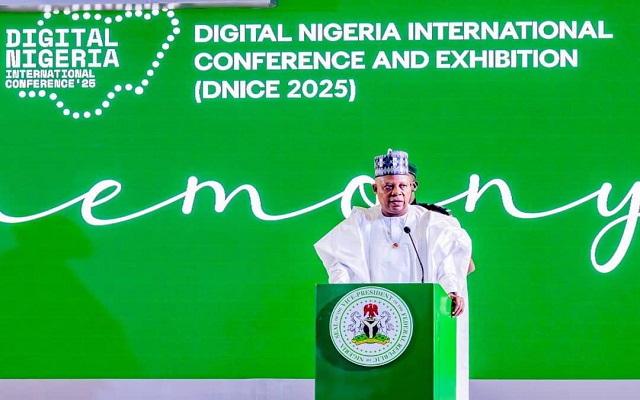Nigeria is taking bold steps toward a future powered by digital innovation, with the Federal Government set to enact the landmark National Digital Economy and E-Governance Bill, a reform expected to reshape governance, service delivery, and national competitiveness.
Vice President, Senator Kashim Shettima made this known in Abuja while declaring open the 2025 Digital Nigeria International Conference and Exhibition, themed “Innovation for a Sustainable Digital Future: Accelerating Growth, Inclusion, and Global Competitiveness.”
Describing the bill as a cornerstone of Nigeria’s ambition to build a $1 trillion economy, Senator Shettima said it represents more than a legislative milestone. “It is a strategic leap toward embedding technology into the fabric of governance, economic planning, and national development,” he stated.
Drawing a parallel with the nation’s cashless policy that catalysed the fintech revolution, the Vice President said the bill’s passage would mark the dawn of a new era.
“Just as the cashless policy unlocked the fintech revolution, this new bill will unlock the govtech revolution, an era of smarter governance, greater transparency, and inclusive service delivery,” he declared.
He explained that this new phase would be driven by robust digital tools and infrastructure, adding that the bill forms part of a broader national strategy to position Nigeria as a global leader in digital innovation capable of transforming every sector of society.
Outlining several initiatives aligned with this vision, Senator Shettima highlighted the integration of digital literacy into school curricula and the digitization of the informal sector to draw millions of Nigerians into the formal economy, and also cited the 3 Million Technical Talent Programme, which aims to develop world-class expertise and make Nigeria a hub for digital skills.
Speaking directly to the youth, he described them as the “lifewire of our nation,” urging them to embrace innovation and creativity.
“You are the innovators, the disruptors, the dreamers who turn possibilities into profits. It is because of you that we are creating an enabling environment that encourages innovation. The language of our long-term stability is digital,” he remarked.
The Vice President also referenced major infrastructure projects designed to ensure equitable digital access across the country. These include the Broadband Superhighway, intended to deliver high-speed internet nationwide, and the Bridge and 7-7-4 initiatives, which aim to give startups in remote towns like Gusau the same digital opportunities as those in major cities such as Abuja and Lagos.
Underscoring the need for equal access, he said equitable connectivity is not just about fairness but a prerequisite for national competitiveness in the digital age.
On policy advancement, Senator Shettima celebrated Nigeria’s emergence as one of the world’s leading fintech ecosystems, attributing the achievement to bold reforms and a forward-looking regulatory environment.
He added that the new bill, once enacted, would consolidate this progress by establishing a unified legal framework for digital governance, electronic transactions, and cybersecurity, while strengthening key institutions such as the National Information Technology Development Agency (NITDA), the Nigerian Communications Commission (NCC), and the Nigerian Data Protection Commission (NDPC) to ensure a secure and innovative digital ecosystem.
Painting a vivid picture of the future, Senator Shettima said he envisions a Nigeria where farmers use real-time market data to secure fair prices, young women in rural communities work remotely for global firms, and universities produce graduates equipped with the skills to compete in the global digital economy. He emphasized that digital transformation must be inclusive, touching every community, every sector, and every citizen.
Declaring the conference open, the Vice President urged participants to seize the moment and contribute meaningfully to shaping Nigeria’s digital future. He reaffirmed the administration’s commitment to ensuring that digital innovation drives opportunity, inclusion, and prosperity for all Nigerians.
The high-profile conference attracted an impressive lineup of participants, including Dr. Bosun Tijani, Minister of Communications, Innovation and Digital Economy; Kashifu Inua Abdullahi, Director General and CEO of NITDA; Dr. Aminu Wada, Executive Vice Chairman of the NCC; Dr. Vincent Olatunji, CEO of the NDPC; Professor Abdullahi Yusuf Ribadu, Executive Secretary of the National Universities Commission; and Engineer Margaret Aina Oguntola, President of the Nigerian Society of Engineers.
Also in attendance were members of the diplomatic corps, service chiefs, heads of paramilitary agencies, senior government officials, and leaders from academia and industry, all united by a shared vision of advancing Nigeria’s digital transformation journey.

